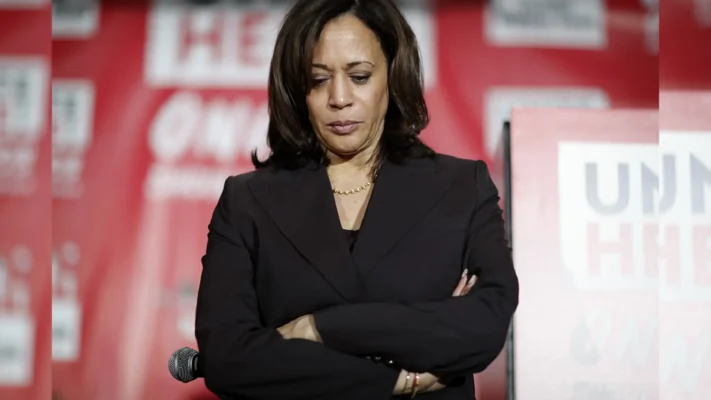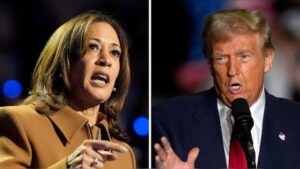
As the 2024 U.S. presidential race intensifies, many political observers are closely watching Vice President Kamala Harris, who had long been speculated as a potential contender for the top job. However, as the campaign unfolds, it has become increasingly apparent that several factors have worked against her, limiting her viability as a front-runner for the Democratic nomination. Despite her historic ascent as the first female, first Black, and first South Asian Vice President of the United States, Harris faces a series of challenges that may prevent her from moving from the White House’s West Wing to the Oval Office.
1. Perception of Underperformance
One of the most significant hurdles Harris faces is the perception that she has underperformed in her role as Vice President. While she was initially lauded for her historic nomination and potential, many have criticized her handling of key issues, such as immigration and the COVID-19 pandemic. The media and public opinion have often framed her as lacking a strong, decisive voice on important matters. Harris’ assignment to manage the Biden administration’s approach to the southern border, for example, drew significant backlash after what many perceived as a lack of clear solutions or effective communication. Her infamous statement during a CBS interview, “I haven’t been to Europe,” when questioned about her handling of the crisis, was seen by critics as a misstep that only fueled doubts about her capability to handle complex international issues.
While some argue that Harris’ assignments were politically motivated or meant to keep her out of the spotlight, the perception of underperformance continues to haunt her. In a race where political skill, experience, and decisiveness are paramount, Harris has struggled to shed the image of being a political figure who is not as effective as expected.
2. The Challenges of Being a Historic Figure
Kamala Harris entered the national stage as a historic figure — the first woman, first Black, and first South Asian Vice President of the United States. However, being a historic figure comes with its own unique challenges. While many voters celebrate her trailblazing status, there is also a tendency to scrutinize her more harshly compared to her male counterparts. Her rise to power has not been without controversy, as her tenure as District Attorney of San Francisco and Attorney General of California has sparked criticism, particularly from progressives who view her criminal justice record as flawed.
Harris’ previous work has left her vulnerable to attacks from both sides of the political spectrum. Conservative critics have frequently pointed to her record on crime as an indication of her alignment with the establishment and law-and-order politics, while some progressives have expressed disappointment in her approach to issues like prison reform, police accountability, and sentencing laws. As a result, Harris finds herself trapped between two hostile wings of her party — a precarious position for anyone seeking to launch a presidential bid.
3. Tension with the Left Wing of the Democratic Party
Kamala Harris has struggled to solidify her support within the Democratic Party’s left wing, particularly among younger and more progressive voters. The Biden administration, under which she serves as Vice President, has faced criticism for being too centrist, especially on issues such as healthcare, climate change, and student debt. Many of the bold promises made during the 2020 Democratic primaries — such as Medicare for All — have yet to be realized, leaving a vocal faction of the party disillusioned with what they perceive as the lack of a transformative agenda.
Harris, who was once considered a champion of progressive causes, has struggled to carve out a distinctive identity apart from President Joe Biden’s policies. While Biden has at times leaned into progressive rhetoric, his administration has largely embraced a moderate approach, which has left some of the Democratic base feeling unenthusiastic about Harris as a successor. Her inability to reconcile these internal divisions within the party could harm her chances in a competitive primary race.
4. The Perception of Weak Leadership
One of the most difficult challenges for Harris is overcoming the perception that she is not a strong leader. Critics have argued that Harris lacks the political finesse and the leadership qualities necessary to run a successful presidential campaign. Her tendency to come across as overly cautious or reactive rather than assertive has led some to question whether she has the gravitas to lead the country.
In recent months, Harris’ leadership style has been scrutinized more than ever, especially as the Biden administration struggles with low approval ratings and rising concerns over issues like inflation, international crises, and domestic unrest. In times of crisis, voters often seek a strong, decisive leader who can offer clear solutions. Unfortunately for Harris, her public appearances and speeches often lack the boldness that many of her peers, such as former President Barack Obama or even current President Joe Biden, have been able to project.
5. Competition from Other Democrats
Kamala Harris is not the only Democratic figure angling for the presidency in 2024. Several prominent Democrats, including Secretary of Transportation Pete Buttigieg, Governor Gavin Newsom of California, and even former First Lady Michelle Obama (rumored, though unconfirmed) have been floated as potential contenders. Many of these figures are viewed as fresh faces with greater appeal to key Democratic constituencies, which could further weaken Harris’ standing within the party.
Buttigieg, in particular, has gained significant media attention and praise for his handling of transportation issues, while Newsom is a rising star in California politics, often seen as a potential successor to Biden’s presidency. If these figures enter the race, they will likely siphon away support from Harris, especially from moderate and progressive voters looking for a new direction.
6. Electability Concerns
Finally, there are lingering concerns over Kamala Harris’ electability in a general election. While she has built a career as a formidable debater and a well-versed policy expert, her favorability numbers are often lower than those of other potential Democratic candidates. The Republican Party has already begun to use Harris as a foil, framing her as a radical left-wing figure who is out of touch with everyday Americans. This narrative could be particularly damaging in swing states, where voters are more likely to prioritize issues like the economy, crime, and national security.
Despite these challenges, Kamala Harris remains an influential figure within the Democratic Party. However, whether she can overcome the significant obstacles in her path and emerge as a viable contender for the White House in 2024 remains to be seen. Her success will depend on her ability to confront criticism head-on, navigate intra-party divisions, and ultimately convince voters that she is the leader they need in a time of national uncertainty. Only time will tell whether Kamala Harris can turn these challenges into stepping stones or if they will prove to be insurmountable barriers to her presidential ambitions.






